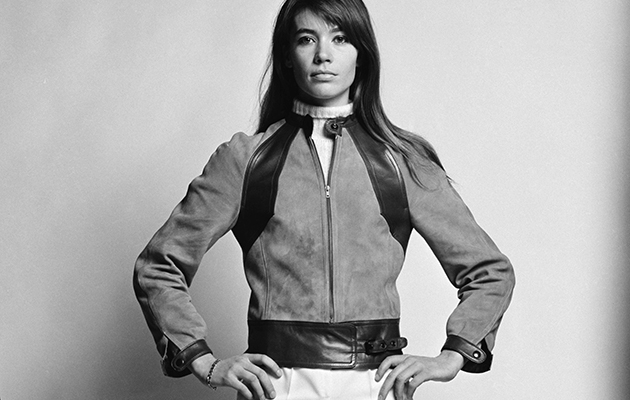In autumn 1970, Françoise Hardy flew to Rio De Janeiro to sit on the jury for the city’s Fifth Popular Song Festival. Her fellow judges included Lalo Schifrin, Marcos Valle, Ray Conniff and Paul Simon, with the latter acting as chair. “Every personality had a hostess,” she explains.
“I had, I don’t know why, a very bad reputation, so the festival sent me their best hostess. But we very quickly became the best friends in the world.”
Hardy’s hostess, Lena, soon introduced the singer to a Brazilian singer-songwriter, Tuca, then performing in a Parisian restaurant, La Feijoada. Hardy fell in love with her music, especially the song “Même Sous La Pluie”, and the two began writing a new album together. The result, La Question, driven by Brazilian-influenced nylon-string guitar, double bass and strings, introduced a new sound for Hardy: heady, sensual and atmospheric, with her voice floating above the meandering baroque backings.
“This album is one of my best souvenirs,” says Hardy. “We started with Tuca on the guitar and a very good jazz bass player – I recorded the voice at the same time as them, then we went to Corsica on holiday with Tuca to decide if we would have strings or not on this record. When we were back in Paris, she played all the songs and for each song she proposed ideas to me for the strings. It has been the only time I have worked like that.”
While she was working with Tuca, Hardy was also on the lookout for other musicians to collaborate with. One songwriter that interested her was Nick Drake. “He had read how enthusiastic I was about one of his albums,” Hardy explains, “and so he came to the studio where I was recording in London, and he sat in the corner, almost hidden, and he never said one word. I was so full of admiration for his work, so I didn’t dare to say anything, and he didn’t dare to say anything [laughs].”
“Joe Boyd came up with this brilliant idea that Nick was going to write an album of songs for Françoise,” says producer and arranger Tony Cox. “I was going to produce it. So we travelled over to Paris – it was all pretty weird because Nick was a painfully shy bloke. Françoise is incredibly neurotic. She won’t do things like shaking hands, because she’s scared of catching germs from people.”
The Drake collaboration never happened, but Cox was keen to work with Hardy regardless. So, in late 1971, the singer travelled once again to London, this time to Chelsea’s Sound Techniques, to record a full album with Cox and a crack team of British folk-rockers, including Richard Thompson and Pat Donaldson.
“I remember they were all very keen to play on the Françoise sessions,” remembers Cox. “Particularly Richard Thompson, which was kind of surprising because he wasn’t someone who really volunteered to play on sessions much.”
“We did the tracks as a trio,” recalls Thompson, “and strings were overdubbed later. Françoise sang guide vocals on all tracks. We all got to hang out during breaks, in the Black Lion pub across the street. She was friendly and charming.”
Chosen songs included Trees’ “The Garden Of Jane Delawney”, Neil Young’s “Till The Morning Comes” and two Beverley Martyn songs. The results were akin to an English version of the Brazilian-influenced La Question: intimate, moonlit, eerie and quietly experimental, as shown by the backwards guitar running through her take on Buffy Sainte-Marie’s “Take My Hand For A While”.
“‘If You Listen’ was a pretty enough song, but there wasn’t anything to really get your teeth into. So I gave all the string instruments a choice to play any notes in any order, but playing col legno, with the wooden back of their bow, and it sounded great. I remember everyone, including Françoise, getting very excited when that sound emerged.”
Shy, reserved, yet strong-willed – it’s this peculiar combination of qualities that seem to have sustained Hardy throughout her career. There are certainly analogues with Nick Drake, in their personalities, voices and even a similar taste in chords and harmony. Yet, while Drake didn’t have the chance to even try his hand at real fame, Hardy has survived decades of it. “The last time I saw Nick Drake,” she says, “he called me at the end of one afternoon. I had always been feeling there was something wrong with him, but I didn’t know exactly what. I was going that evening to the restaurant of the Tour Eiffel to have dinner, because Véronique Sanson was performing there. But I felt I couldn’t leave him alone, so I said, ‘Come, and I’ll take you to the Tour Eiffel.’
“I don’t recall how the night ended, probably in a very normal way. But I was not surprised when I heard… He had everything going for him; he was very good-looking, mysterious and talented. There are always many reasons [for depression], but maybe one of them is the fact he had no success at all. C’était la goutte d’eau qui a fait déborder le vase [it was the straw that broke the camel’s back]…”


